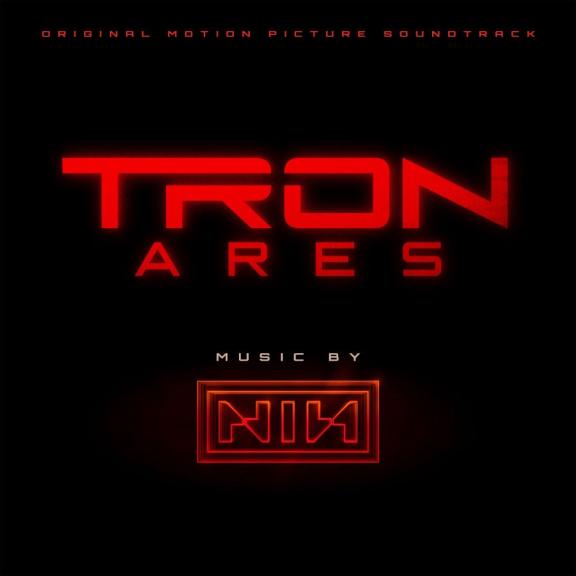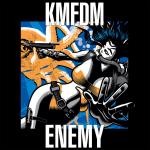If there's one turning point in Trent Reznor's career that would have been difficult to predict, it's this one: now a respected composer for Hollywood, he's teamed up with Disney! Well, note that the soundtrack for Tron: Ares is not his first for the Mickey Mouse empire, as he won a Golden Globe and an Oscar for Soul's OST in 2020. However, he and his inseparable partner Atticus Ross have signed the result under the name Nine Inch Nails... a logo used for the first time by the two artists on their work for cinema. It's amusing to see how this has been turned into a real marketing tool to promote a film whose main star, Jared Leto, is now persona non grata in Hollywood since he has been accused by several people of sexually assaulting minors. In the trailer for Tron: Ares, the NIN logo appears in bright red, larger than the name of the director, or even the film's title itself, and stands out as the only signature that Disney has decided to use to promote its film.
Beyond these marketing questions, where is Corpo-Trent going to take us this time? Well, we're not going to feign surprise: the atmospheric layers and keyboards of the Reznor-Ross duo are instantly recognizable. Nevertheless, we appreciate the futuristic background imposed by the film, giving the compositions a slight cyberpunk neon flavor. The raw Trent Reznor who used to spit his guts out didn't really make it through the 2000s, and here again, as since his meeting with Atticus Ross, Nine Inch Nails seeks more to immerse us in its synthetic universe than to turn us upside down. The duo takes a modern approach to film music, more akin to accompaniment flirting with abstraction than orchestral score, more like Hans Zimmer's scores for Christopher Nolan than John Williams' work, basically. Here, the nuance comes precisely from the Nine Inch Nails signature, which consequently imposes the presence of “classic tracks” with vocals on this soundtrack. This raises another set of questions...
As Alive As You Need Me To Be, the single and first track with lyrics, hooks us with its bass line and EBSM/darksynth nuances (influences that recur in A Question of Trust, for example). It's well done, of course, as usual, but it's impossible in such a familiar and predictable construction not to sometimes feel like you're listening to the parody This is a Trent Reznor Song, which highlighted the artist's gimmicks and remains relevant ten years later. It's not surprising that a single follows a tried and tested formula. But when it's done in the context of promoting a Disney blockbuster, it can also give the unpleasant impression that Nine Inch Nails, with its logo, expertise, and formulas, is a brand, a license that the American company can buy and monetize. The entire aesthetic of this new album is dictated by the futuristic world of Tron: Ares, and it saddens us to imagine that Disney is dictating a course of action to Nine Inch Nails. Upon hearing this predictable and consensual single, we think, with a touch of bitterness, that Artificial Intelligence and their imitations of life are ultimately just one theme among many in the cyberpunk universe... From there, it's only a short step to seeing a double meaning in the title and concluding that Reznor is indeed doing the bare minimum and is no more alive than we need him to be!
In a collection of mostly instrumental and illustrative music, the vocal tracks quickly take precedence in our minds, and this can have a (perhaps) unfortunate side effect: we are deprived of a memorable theme to associate with the film. In the past, we remember how the Reznor-Ross duo, who are so fond of atmospheric layers, could sometimes hook us by reviving EBM/industrial influences or a little of Nine Inch Nails' bite for the duration of a strong musical theme (Watchmen, Teenage Mutant Ninja Turtles...). The soundtrack to Tron: Ares is not lacking in creeping cybernetic mysteries (Init and Forked Reality work very well at the beginning of the album), but it lacks a truly solid theme (although This Changes Everything could almost fill that role). Without images to complement the music, we regret the absence of a strong melody, an identity that would allow the soundtrack to exist fully independently of the film.
Nevertheless, it still manages to send shivers down your spine. The progressive density of I Know You Can Feel It joins the “best Nine Inch Nails songs post-YearZero” list, with its tortured guitars that eventually burst forth as they did in The Fragile era and Reznor's voice, which seems to have rejuvenated since the Not the Actual Events / Add Violence / Bad Witch trilogy. The same goes for Shadow Over Me, which concludes the album, both catchy and biting, full of tension that explodes. Enigmatic, hypnotic, and emotionally charged, these tracks raise another question: if Tron: Ares can be seen as a commissioned album that follows a set of specifications, to what extent should we trust the emotions we detect in it? In other words, is Reznor as involved as he seems, or is he just a very good actor? We ask ourselves this question with every tear he sheds, night after night, for thirty years while performing Hurt on stage, and we ask it again here. The duet with singer Judeline also reminds us that Trent Reznor's work fits very well in contrast with artists from different registers (remember the album he made with Halsey)... and what if, ultimately, it is when he corrupts the sweetness of other artists, who in return bring him their sensibilities, that the duo behind NIN still manages to surprise us the most?
Over time, the work will remain, separated from the context of its creation, and will be appreciated as such. That is to say, a soundtrack in which the two artists play with textures, worlds, and atmospheres, while still providing sufficient narrative scope. Infiltrator gets you dancing, 100% Expendables, Building Better Worlds and Ghost in the Machine seem to borrow from John Carpenter, Philip Glass and Goblin to plunge us into a synthetic fog that is both mystical and deliberately retro, while every piano note in Still Remains, set against melancholic layers of synths, screams the DNA of its authors, etc. Thanks to the duo's expertise, the result is full of interesting moments and is more expressive and theatrical than the Ghosts series. It is also more uniform. Unfortunately, NIN seems to have arrived a little late to this retro-futuristic genre, and in a similar vein, we much prefer the soundtrack to the video game Cyberpunk 2077, both in its contemplative and more muscular moments.
Reading this, you might get the impression that we're being harsh. Let's clarify that: Tron: Ares is a beautiful piece of work, well done, often captivating, immersive, more accessible, appealing, and relatable than other works by the duo that are purely atmospheric or accompaniment. We couldn't expect less from Reznor and Ross, who we now have to accept are major figures in American film composition, people who are described as “geniuses” in the same way that we say “the earth is round”: only madmen would dare to contradict that. On the other hand, we could have expected more. While NIN's releases since Hesitation Marks have reconnected with more visceral and captivating experiences, we find ourselves with a bit of the same impression we had in 2013, that NIN has lost its humanity and tends to neglect emotions in favor of production.
Tron: Ares nevertheless too often follows predictable formulas, and it's impossible to shake the uncomfortable feeling that NIN has been sold out in order to fit into the mold dictated by Disney. This observation can only leave us feeling cautious at best, and frankly bitter at worst. In 2010, the soundtrack composed by Daft Punk for Tron: Legacy made a lasting impression (much more so than the film itself), winning over even those most resistant to the masked duo. Will the Tron: Ares soundtrack do as well? Perhaps. It's still a little hard to realize that Nine Inch Nails is now an all-powerful brand that is universally acclaimed and continues to conquer the world, with all the muggles and hipsters shouting about its genius! While the result is nothing to be ashamed of, we hope that this won't be the last NIN release and we're keeping our fingers crossed that the logo won't end up stamped on any blockbuster that's willing to pay the price. It does the job, Reznor and Ross's total mastery of their subject is impressive, and the ease with which they always know how to capture attention and suspend time with a single note or a silence commands respect...
So, we'll play Tron: Ares in the background for a while, and praise for the genius of Reznor and Ross will rain down in a knowing tone that we won't question with the usual exaggeration required to appear sincere or knowledgeable... Then, in a few weeks' time, streaming platforms will offer us something else to press “play” on, a new object of hype that will monopolize attention during its fifteen minutes of fame, and we'll move on to something else.





